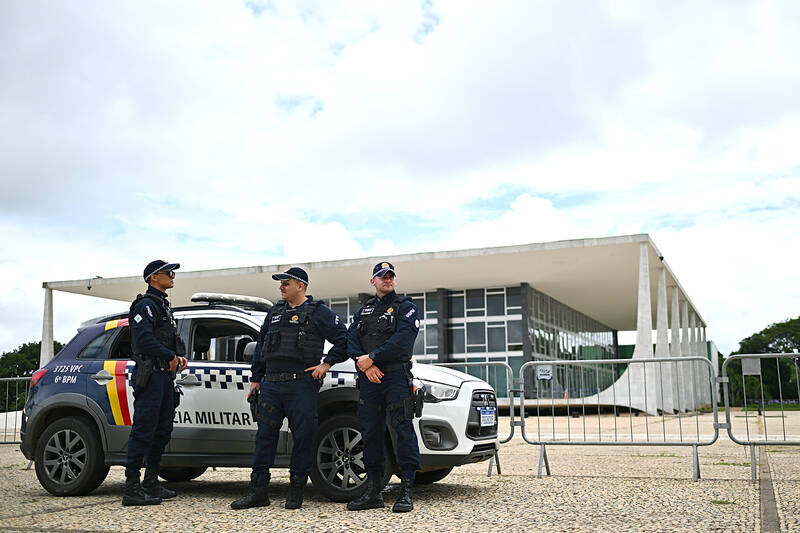The family of a Brazilian journalist who was tortured and killed during the country’s military dictatorship on Wednesday welcomed a court decision to grant a monthly stipend to his widow — marking a gesture of reparation in a nation still haunted by that two-decade period.
The federal court in Brazil’s capital, Brasilia, ordered the government to pay about 34,000 reals (US$5,900) per month to Clarice Herzog, 83, for the rest of her life. It is part of a broader push that is underway for reconciliation with the nation’s past.
Clarice Herzog’s lifelong fight for justice echoes that of Eunice Paiva, the wife of leftist lawmaker Rubens Paiva, likewise killed by the military regime. That story is told in the movie I’m Still Here, which is up for three Academy awards — including Best Picture and Best Actress — and has been a box office success.

Photo: EPA-EFE
Last month, Brazilian notaries began issuing hundreds of corrected death certificates for victims of the dictatorship, which state that the deaths were not natural, but violent and caused by the state, local media said.
The Vladimir Herzog Institute and the Herzog family celebrated the decision, which they called “an important milestone” in a statement.
Vladimir Herzog was killed nearly 50 years ago on Oct. 25, 1975. Due to the plaintiff’s age and ill health, the decision issued on Jan. 31 is effective immediately.
On the day of his death, Vladimir Herzog voluntarily presented himself to a military barracks after being summoned. The military tried to frame his death as a suicide and issued a photograph of him hanging by the neck from a rope; the gambit backfired, and the image was transformed into an iconic display of the regime’s brutality.
The prestigious journalist’s murder and the debunked story of his suicide sparked what is considered one of the first mass protests targeting the military regime that lasted from 1964 to 1985.
In 2018, the Inter-American Court of Human Rights issued a ruling condemning the Brazilian state for Vladimir Herzog’s torture and murder, and for the failure to investigate and hold military dictatorship agents responsible.
That ruling ordered Brazil to pay economic compensation to Clarice Herzog. The Brazilian Ministry of Human Rights and Citizenship in a statement said that she has already received 100,000 reals, an amount that Vladimir Herzog Institute executive director Rogerio Sottili called “symbolic.”
“The example that remains is that you can do anything and nothing will happen to you,” Sottilli added.
Last month, the Herzog family filed a request for adequate financial compensation, Sottili said.
The decision to grant Vladimir Herzog’s wife a monthly payment “goes in the direction of Brazil trying to do what it has never done, which is to confront the state’s past violence,” Sottili said in a phone call from Sao Paulo.
The government can appeal. The ministry’s statement did not say whether it intends to, but noted the previously paid amount and that the government’s amnesty commission already issued a formal apology to Clarice Herzog for her persecution when fighting for justice.
Unlike countries like Argentina and Chile, which established truth commissions and prosecuted former dictators and their henchmen, Brazil’s transition back to democracy was marked by a sweeping amnesty to military officials.

Former Nicaraguan president Violeta Chamorro, who brought peace to Nicaragua after years of war and was the first woman elected president in the Americas, died on Saturday at the age of 95, her family said. Chamorro, who ruled the poor Central American country from 1990 to 1997, “died in peace, surrounded by the affection and love of her children,” said a statement issued by her four children. As president, Chamorro ended a civil war that had raged for much of the 1980s as US-backed rebels known as the “Contras” fought the leftist Sandinista government. That conflict made Nicaragua one of

COMPETITION: The US and Russia make up about 90 percent of the world stockpile and are adding new versions, while China’s nuclear force is steadily rising, SIPRI said Most of the world’s nuclear-armed states continued to modernize their arsenals last year, setting the stage for a new nuclear arms race, the Stockholm International Peace Research Institute (SIPRI) said yesterday. Nuclear powers including the US and Russia — which account for about 90 percent of the world’s stockpile — had spent time last year “upgrading existing weapons and adding newer versions,” researchers said. Since the end of the Cold War, old warheads have generally been dismantled quicker than new ones have been deployed, resulting in a decrease in the overall number of warheads. However, SIPRI said that the trend was likely

BOMBARDMENT: Moscow sent more than 440 drones and 32 missiles, Volodymyr Zelenskiy said, in ‘one of the most terrifying strikes’ on the capital in recent months A nighttime Russian missile and drone bombardment of Ukraine killed at least 15 people and injured 116 while they slept in their homes, local officials said yesterday, with the main barrage centering on the capital, Kyiv. Kyiv City Military Administration head Tymur Tkachenko said 14 people were killed and 99 were injured as explosions echoed across the city for hours during the night. The bombardment demolished a nine-story residential building, destroying dozens of apartments. Emergency workers were at the scene to rescue people from under the rubble. Russia flung more than 440 drones and 32 missiles at Ukraine, Ukrainian President Volodymyr Zelenskiy

Indonesia’s Mount Lewotobi Laki-Laki yesterday erupted again with giant ash and smoke plumes after forcing evacuations of villages and flight cancelations, including to and from the resort island of Bali. Several eruptions sent ash up to 5km into the sky on Tuesday evening to yesterday afternoon. An eruption on Tuesday afternoon sent thick, gray clouds 10km into the sky that expanded into a mushroom-shaped ash cloud visible as much as 150km kilometers away. The eruption alert was raised on Tuesday to the highest level and the danger zone where people are recommended to leave was expanded to 8km from the crater. Officers also